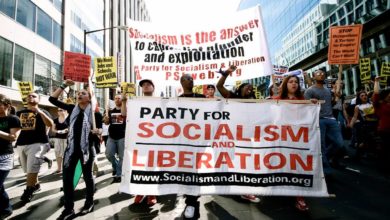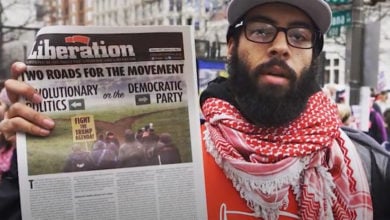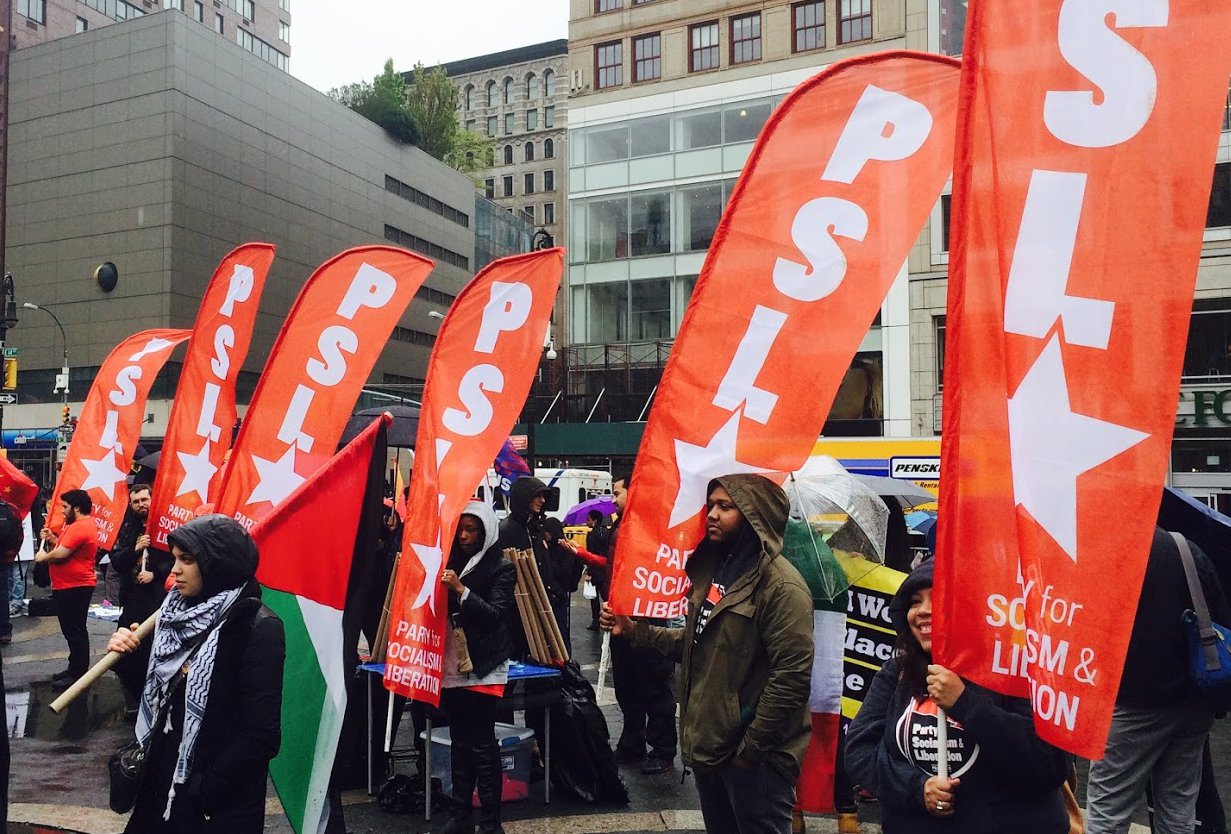Following is a talk
given in a panel titled “Socialism and the Latin American revolution” at the
Nov. 13-14, 2010, National Conference on Socialism sponsored by the Party for
Socialism and Liberation.
Although Mexico is our closest neighbor and its workers are
responsible for the most dramatic demographic shift in the United States since
the mass migrations from Europe, we know little about the country’s
revolutionary history and its rich culture. In recent years, particularly after
the 1994 North American Free Trade Agreement, Mexico’s working class, its
campesinos and its oppressed have been on an accelerated path towards the
inevitable clash with the powerful establishment and economic interests of its
own corrupt ruling class, as well as the interests of U.S. imperialism.
On top of experiencing dramatic shifts in bourgeois
elections, record numbers of killings due to the drug war, a huge emigration
and consequent labor vacuum that has left the country in poverty, Mexico now
has to endure the most damaging economic crisis in the past three decades and
possibly the last 70 years. These crises stem from Mexico’s dependence on U.S.
capital and investment, in particular the U.S. neoliberal economic policies,
policies that overwhelmingly benefit U.S. corporations and leave their
“partner” in abject poverty. It is as the controversial Mexican figure,
Porfirio Diaz, once said: “Poor Mexico, so far from God and so close to the
United States.”
Here are some shocking figures:
- In the last year, there has been a rise of 14 percent in
kidnappings with a number of high-profile cases involving heads of state and
municipal governments, and in many cases their relatives. - As of 2009, remittances,
which are Mexico’s number two source of foreign income after oil exports, have
plummeted 18 percent. An example of how extensive the crisis is that has hit
Mexico can be seen in the case of Oaxaca, where in 2008 the amount of money
received was $456 million and in 2009 it was $194 million, a drop of almost 57
percent. - Since 2006, more than 28,000 people have been assassinated
due to the violence of organized crime, with more than 1,756 people killed this
year alone.
However, these statistics don’t exist in a void. The main
point of this talk is to emphasize the key role the United States plays in
Mexico’s current crises, and here are some headlines that support this point:
- According to a recent study by the “Mayors Against Illegal
Guns,” U.S. government data shows that 75 percent of guns used in crimes in
Mexico are purchased in the four U.S. states that border Mexico: Texas, New
Mexico, Arizona and California. Overall, 19,000 U.S. guns were used between
2006 and 2009. - In April of this year, it was reported that Wachovia (a
banking institution that was bailed-out in 2008 with $54 billion of tax payer
money) was caught laundering money for drug cartels to the tune of $378 billion
between 2004 and 2007. - Finally, as the economy in the United States has begun to
plummet, the ruling class has put into high gear its racist campaign against
immigrants, particularly Latinos, not only with the intention of sending back
as many immigrants to a country that the U.S. ruling class benefited from
decimating, but intending to instill absolute fear in an entire people so that
they remain silent under wage slavery and oppression in the era of an economic
crisis.
This contradiction between the U.S. capitalists’ prosperity
that developed on the backs of Mexican workers and the Mexican state, and the
launching of a vicious anti-immigrant campaign that seeks to scapegoat the very
same people for the collapse of the prosperity they toiled long and hard for,
has led to an admission by the right-wing Mexican “president” Felipe Calderon:
Ellos provocan un conflicto en un país pobre y
en atraso como África, que están lucrando igualmente con esta situación como la
que vive el pueblo de México. Para ellos (los estadounidenses) es negocio venderles armas a los
criminales.”
Translation: “They provoke conflicts in poor and developing countries like
Africa, which they are benefiting from, just like the situation the people of
Mexico are living today. To them, it is a business to sell arms to criminals.”
The sentiment expressed in this small statement of
“sovereignty” was once the norm for a country that has a rich history of
revolutions, popular uprisings and nationalist pride. Mexico has experienced two revolutions. One
was in 1810 led by Miguel Hidalgo y Costilla, a Catholic priest of Spanish
descent and progressive ideas, who declared Mexico’s independence from Spanish
colonialism in the small town of Dolores at daybreak on Sept. 16 with the now
famous “Grito de Dolores.”
The other is known as the Mexican Revolution. From 1910 to 1920,
after Porfirio Diaz had ruled Mexico for almost 30 years, coup after coup gave
rise to people’s militias and famous revolutionaries, like Pancho Villa in the north
and Emiliano Zapata in the south, who fought for the campesinos’ right to the
land on which they toiled for the oligarchy.
This demand was met in the 1917 constitution, which included the famous
“Article 27” that declared that all property is originally owned by the nation
and can be expropriated for public utility
The constitution’s many reforms did not come into fruition,
however, until the 1930s, when the worldwide capitalist economic crisis brought
a radicalization of the working class from the United States to Mexico to Cuba
to many other countries in Latin America and worldwide. It was the Mexican
working class and campesinos that propelled the government of Lazaro Cardenas
to nationalize Mexico’s oil and expropriate it from the U.S. and British oil
companies. In those years, virtually every industry–mining, national
transport, oil, airlines, the land, railroads–was taken over by the state. The
country’s national economic development was able to bring about much more
progress.
But all of these gains and struggles were still within the
capitalist system, and so eventually, as we see with regard to the great gains
made by U.S. workers (social Security, unemployment, welfare rights, education,
etc.) where over time they become eroded and stolen back, the same phenomenon
is taking place in Mexico, but on a much larger scale. This is because it is
U.S. imperialism that is dictating Mexico’s economy. An oppressed capitalist
country, right next to the United States, could not compete over time and
protect its nationalized industries from imperialist pressure.
In 1982, the world oil market prices plunged from $32 a
barrel to $13. This meant that, effectively, Mexico’s foreign debt to the banks
more than doubled. Mexico had to borrow huge loans from the U.S.-controlled
World Bank and for every new loan, there was a new concession to the United
States. The final blow was a strategic economic agreement that amounted to a
surrender of Mexico’s national economic independence that it gained in the
early 20th century. This agreement is called NAFTA, which stands for the North
American Free Trade Agreement.
The infamous president Carlos Salinas de Gortari, who was in
office from 1988 to 1994, was responsible for the privatization of numerous
national companies like the national telecommunication giant Telmex and the
national broadcasting network Imevisión. He was also responsible for signing
NAFTA. NAFTA dealt the final blows to any form of social wealth that had been
fought for in the past. Shortly thereafter, he left the country, having been
charged with stealing hundreds of millions of dollars from the government. The
succeeding presidents Ernesto Zedillo and now Felipe Calderon have been backed
by the U.S. government for their pro-U.S., pro-neoliberal policies that
continue to sell off every last vestige of Mexican wealth.
This withering of national economic sovereignty has left
Mexico under the control of U.S. foreign policy, which is more and more
resembling U.S. foreign intervention. At a recent meeting of the Council on
Foreign Relations, Hillary Clinton said that the United States is prepared to
widen the so-called War on Drugs into a Plan Colombia-style initiative for
Mexico and Central America. She went even further by stating that the drug
cartels in Mexico are coming to resemble an insurgency: “These drug
cartels are now showing more and more indices of insurgency.” Suggesting that
the United States must intervene, she finished off by saying “The world is
counting on us.”
As this revolutionary nation recently experienced the
celebration of its bicentennial, 200 years since a “grito por independencia”
which sought to free the poorest of the poor, Mexico finds itself entering a
period of rising conflict which is only exacerbated by its increasingly hostile
neighbor to the north. Its people, spread out amongst two countries, are faced
with daunting obstacles. On one side of the fence Mexicans face the
exploitation of a corrupt government and drug cartels, on the other, they face
exploitation by an imperialist government and rising anti-immigrant hatred. On
one side of the fence, Mexicans are being exposed to the once-masked façade of
capitalism, and on the other, they are witness to the unmasked deformity of
imperialism. But the solution, as it was in 1810 and 1910, remains the
same.
Even as dire as the situation is in Mexico today, there are
many struggles taking place that the government cannot entirely repress: the
struggle in Oaxaca of the teachers and against the state government there; the
legacy of the Zapatistas and resurgence of the Indigenous consciousness and
struggle for equality. And perhaps what the U.S. imperialists fear most is the
knowledge that the elections in 2012 may reflect what has taken place in
Bolivia, Ecuador and Venezuela. We do not say this will resolve Mexico’s problems
by any means, but the mass movement that arose after the Calderon fraudulent
election five years ago may find its way again, and demand an end to the
militarization of Mexico and an end to the wholesale theft of Mexico by the
United States.
And we in the Party for Socialism and Liberation stand with
the Mexican people, for full rights for all immigrants in the United States,
the elimination of the border wall, and demand no U.S. intervention in
Mexico.






